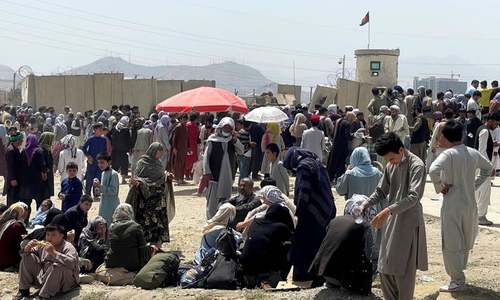THE Afghan Taliban’s retaking of Kabul may be the climax of a 20-year-long war in Afghanistan but it is difficult to suggest that this will put an end to the proxy warfare being fought on Afghan soil since the 1970s between multiple external and internal actors. It has been one of the longest irregular wars fought in recent history. There may be a hiatus after the Taliban ‘victory’ but the religiously inspired radical group conceives itself as an ideological force, and ideology certainly provides the perfect breeding ground for both hybrid and proxy wars.
From an ideological standpoint, despite their internal differences over interpretation of the text or political strategies they follow, most religious extremist and terrorist groups will remain ideal partners for the Taliban. Those sharing a worldview different from that of the Taliban will remain in the opposite camp unless co-opted by the latter in a political arrangement. This could be a favourable situation for external actors, who can find like-minded friends among the domestic actors desperate to win external support.
Apparently, external stakeholders want stability in Afghanistan, and the US and its Nato allies are no longer interested in extending financial and military support to the country. Their priority will be to use political coercion to ensure the Taliban don’t deviate from the commitments they made to the international community. Meanwhile, China, Pakistan, Russia and Iran are engaging with the Taliban, thinking of ways to deal with the terrorist networks threatening their security.
Though optimism about the Taliban fulfilling their promises is on the wane, even partial fulfilment can take the war-torn country on a new journey and away from another phase of proxy warfare. Otherwise, there is a strong probability that Afghanistan will become a much uglier front for proxy warfare, which can trigger political agitations and violent movements against the Taliban regime.
A lobby in the US favours a plan for proxy warfare so that America can sustain its global influence.
Pakistan and India have had their favourites in Afghanistan, and both have a long history of fighting proxy wars against each other. India has openly opposed the Taliban during the last 20 years and projected them as Pakistan’s proxy. With the Taliban’s return to power, the risks are high for another round of India-Pakistan proxy war in Afghanistan. Many conceive the Taliban takeover as the defeat of India’s soft power and covert strategy in Afghanistan. India will continue to use all its overt and covert tactics to take revenge, which can keep political temperatures high in the region. The situation can turn grimmer if India and its favourites in Afghanistan succeed in winning US support; India will certainly lobby for that scenario to become a reality.
There is a lobby in the US that favours a long-term plan for proxy warfare so that America can sustain its global influence to achieve strategic objectives which cannot be attained through regular warfare. Containing China is the ‘legitimate’ excuse for the strategists in Washington, D.C. to keep China busy in its immediate neighbourhood. Iran could be another excuse. Anti-Pakistan sentiments are also high in Washington as the country is portrayed as the sole reason for the US defeat in Afghanistan. Pakistan can be both a player in and victim of the new proxy warfare if it is initiated.
Though secret wars do not stay secret for long, these are cost-effective and the political fallout is far less compared with direct interventions. Once the US sets the limits and objectives of proxy warfare in Afghanistan, the chaos will increase at a level that the Taliban would not be able to handle. An active civil society is still there, and the frustrations of the urban middle classes have not been managed by the Taliban yet. There are heightened prospects of the Taliban introducing a more brutal regime rather than addressing the people’s grievances.
Proxy warfare is transnational in most cases. Pakistan shares its longest border with Afghanistan, has reliable favourites in power in Kabul, and may continue to play a leading role in any emerging situation there relying on its ability to adjust with the designs of any world power contender. Chances appear bleak that Pakistan will be a partner of the US in a likely proxy war because of a sense of betrayal as well as the Indian factor. But at any critical juncture, Washington will have to look towards Rawalpindi, and this would be a decisive moment for the security establishment for picking a clear side.
The Taliban have many advantages in that context. First, they are well acquainted with the dynamics of proxy play where they have also had a role. Al Qaeda, IS (Khorasan chapter) and TTP were merely their tools through which the US withdrawal was made possible and the Taliban could engage with Pakistan, China and Russia.
Second, they have time on their side as no external power will seemingly take the risk of a military intervention in Afghanistan in the next few years.
The third and critical strength is their ideological power to justify their deeds and control. The ideology has its demerits as well and the ideological divide creates rifts and triggers power struggles. External actors, especially those who share similar ideological and religious leanings, can easily intervene. Qatar has played an effective role in the US-Taliban deal, and it has made inroads in the ranks of the Taliban political leadership. However, the military leadership of the Taliban seems more inclined towards Saudi Arabia and the UAE. Both countries are close allies of the US and have been developing a strategic relationship with India. The Taliban can also exploit sectarian fault lines in the neighbourhood and get certain advantages.
The Taliban leadership can avoid or minimise the effects of a looming proxy war while developing a functional relationship with other political stakeholders as well as civil society in the country. They can get the economic and political support of neighbouring countries mainly China, Pakistan, Russia and the Central Asian nations while seriously considering their apprehensions and addressing their concerns.
Otherwise, the Taliban will have to get ready for a bumpy ride ahead.
The writer is a security analyst.
Published in Dawn, September 19th, 2021














































